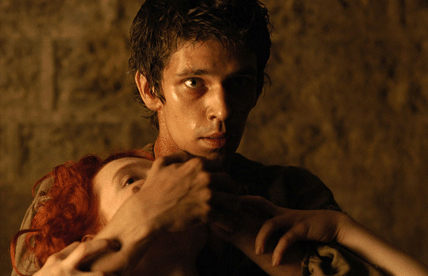
Perfume: The Story of a Murderer (Movie Review)
Though an international success, “Perfume: The Story of a Murderer” tanked in the US, receiving only a limited release despite being a big budget movie from a respected director starring bankable actors. Many critics panned it as repulsive and morally reprehensible, an easy charge to make against a movie which begins with a fishmonger casually dropping behind her booth to give birth among fish heads and entrails and climaxes with a frenzied 750 person orgy and an act of cannibalism. While the budget, cast and period costumes say Oscar-bait, the gore, depravity and lack of boundaries make “Perfume” perhaps the most lavish grindhouse movie of all time.
Patrick Süskind’s 1985 novel “Perfume: The Story of a Murderer” had a long and troubled path to the screen. Süskind allegedly thought the only directors capable of filming the book were Stanley Kubrick or Milos Foreman, and Kubrick actually toyed with the idea of adapting the book but ultimately declared the story unfilmable and abandoned the project. In the meantime the book steadily grew a cult following which exploded in the US after Kurt Cobain named “Perfume” as his favorite book and wrote a direct homage to it in the form of the song “Scentless Apprentice”. In the wake of this wave of renewed interest, Süskind steadfastly refused to sell the rights and even co-wrote a film satirizing the attempts to adapt the book. Finally, in 2000 he caved to the tune of $10 million. “Run Lola Run” director Tom Tykwer took over with the largest budget ever for a German film and a cast including Dustin Hoffman, Alan Rickman and John Hurt.
The murderer of the title is Jean-Baptiste Grenouille, a wretched street urchin in pre-revolutionary France. Grenouille is remarkable in two ways: he has a superhuman sense of smell, but he himself has no scent at all, a peculiar trait that causes people to be inexplicably repulsed by him. One day he finds the most alluring scent coming from a beautiful red-head who he kills in order to get closer to the smell. It doesn’t linger after death and he subsequently makes it his life's work to find a way to collect and preserve this divine scent.
His talents naturally lead to him becoming an apprentice perfumer, an important trade in the stink and filth of 18th-century Paris. As he learns the techniques of extracting the essential odor of plants and flowers he’s disappointed when he learns that these techniques can’t distill the scents of materials like glass and iron, unaware that those of us not blessed with such a remarkable nose can't smell these things at all. Determined to learn new, more powerful techniques he sets off for Grasse, the home of the greatest perfumers in the world.
In Grasse he not only learns these new techniques but is also reacquainted with the scent he’s been chasing for so long, this time emanating from the daughter of a powerful nobleman. Convinced that her distilled scent will result in the most powerful perfume the world has ever smelled, Grenouille sets out to perfect the new techniques he’s learning by killing beautiful young virginal girls in order to boil them in vats of liquid or slather them with scent-leeching animal fat.
In the tradition of films like “Henry: Portrait of a Serial Killer” and “Hannibal”, “Perfume” attempts to make a sympathetic character out of a mass murderer. Grenouille is simultaneously subhuman and superhuman, a soulless psychopath and a great artist. Because he has so little connection to the rest of humanity, most of his internal dialogue is played out through a voice-over which lends an disturbingly fairy-tale-like tone to the movie. Grenouille is a genius at what he does and it's hard not to cheer him on in his quest to produce a work of perfect beauty, even if it comes at such a grisly price.
There’s something undeniably absurd about making a movie based in the world of smell, but the film goes out of its way to use visuals to convey scents, both pleasant and unpleasant. There’s no small amount of disgusting imagery but it’s so lovingly and carefully shot that there’s a kind of beauty to all the grime and grue. It’s hard not to feel a little dirty and gross after watching this movie, a testament to the power of images and sound to fill in for the visceral odors the movie can't provide.
The film is remarkably faithful to the book both to its credit and its detriment. It’s amazing that all the nudity, filth and general unpleasantness of the book made it to screen intact in a production this size. Sustained over two and a half hours, though, it all gets to be a bit much. The bloated run time causes the film to drag in parts and such a long wallow in the muck will test the patience and will of many viewers. For those with the stomach and the inclination to appreciate lurid trash and artful filmmaking equally, “Perfume” is a well-composed whiff of the dark side of passion, obsession and instinct gone bad.

